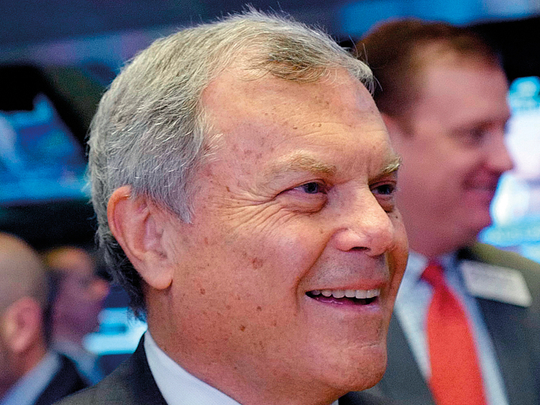
London: Martin Sorrell’s dramatic departure as chief executive of WPP, the world’s biggest advertising agency he founded 33 years ago, sent shock waves through the marketing industry on Sunday.
Sorrell, 73, stepped down suddenly, 10 days after the British ad giant launched an independent investigation into allegations of personal misconduct through the misuse of company assets.
WPP said the probe had concluded, adding that “the allegation did not involve amounts that are material”.
He was easily the longest serving chief executive of a company on London’s benchmark FTSE 100 share index, having held the position since 1985.
The departure of one of Britain’s best-known businessmen leaves the advertising giant needing fresh leadership at a testing time for the marketing industry, with social media companies offering brands a direct connection with vast audiences.
Sorrell said in a statement late Saturday that he was sad to leave, with WPP having been his passion and focus for more than three decades.
“The current disruption is simply putting too much unnecessary pressure on the business, our over 200,000 people and their 500,000 or so dependents, and the clients we serve in 112 countries,” he said.
“That is why I have decided that in your interest, in the interest of our clients, in the interest of all share owners, both big and small, and in the interest of all our other stakeholders, it is best for me to step aside.”
Sky News television’s City editor Mark Kleinman said his resignation was one of the most significant exits of a FTSE 100 company chief executive for many years.
“His departure will leave the company he built virtually from scratch facing profound questions about its future direction,” he said.
Buffeted by competition
Despite the misconduct investigation, some commentators said it was the fact that the company had lost a third of its value over the past 12 months — in the face of competition from the likes of Google and Facebook — that cost Sorrell his post.
Simon Jack, the BBC’s business editor, said his legacy as an advertising industry titan was secure.
However, “in the end, it was the trends in world business that wrong-footed the sprawling empire he created.
“Shareholders were getting restless,” he wrote, and Sorrell “had lost the unanimous backing of the board”.
WPP said Sorrell would be treated as having retired, with chairman Roberto Quarta becoming executive chairman until a new chief executive is appointed.
“Sir Martin has been the driving force behind the expansion of WPP to create the global leader in marketing services,” said Quarta.
“During this time, the company has been successful because it has valued and nurtured outstanding talent at every level.”
Sorrell denied any wrongdoing after the allegations surfaced earlier this month, but said he understood the company had to investigate.
Huge pay packet
Born in London, Sorrell studied economics at the University of Cambridge and then gained a masters from Harvard University.
He joined the Saatchi and Saatchi advertising agency in 1975 before founding WPP.
He formed it from a shell company, Wire and Plastic Products, re-establishing what had been a wire baskets manufacturer as a marketing services group in 1986.
The firm has grown into one of the world’s largest communications groups and now has some 3,000 offices.
He received a knighthood from Queen Elizabeth II in 2000.
Sorrell made headlines in recent years regarding his sizeable pay at a time when traditional advertising groups struggle against fierce competition from the likes of Google and Facebook.
According to research from the High Pay Centre think tank, Sorrell was Britain’s best-paid boss in 2015, with a package of more than £70 million (Dh366 million, $100 million, €80 million) that year.
However, he always fiercely defended his income, saying it was related to how well the company he started from nothing was doing.
“Yes he was relentless and richly rewarded — but let’s not forget Sir Martin Sorrell built a global advertising empire from nothing,” said Lionel Barber, editor of the Financial Times newspaper.
The Sunday Times newspaper’s Rich List 2017 said he was worth £495 million, with his assets up £100 million over the previous 12 months.












